Gluttons for Punishment
An inside look at Power Slap, Dana White's next big bet.
Shaking Makini “Big Mak” Manu’s hand, which runs 10.5 inches from thumb to pinky, makes me feel small in the way that a starry night sky does. To the touch, Manu’s right paw resembles a baseball glove filled with sand. I briefly calculate how much money it would take me to let Manu slap me in the face, abandoning the effort once my hypothetical sum surpasses my student loan debt. At Power Slap 14 in New Orleans, Duane “The Iron Giant” Crespo will do it for $5,000.
Manu’s smile is as infectious as his body is imposing. The super heavyweight is a renaissance man: proud father, husband, coach, sumo wrestler, multi-instrumentalist, former college and professional lineman, devout Mormon, aspiring WWE wrestler, and working stunt man. Each gig he cobbles together is in service of a tangible goal. Be it through film, music, or sports, Makini Manu was born to be an entertainer. In pursuit of this, he is relentlessly ambitious, frequently rejected, and devoutly faithful. At the moment, the most consistent presence in his life outside of his immediate family is the girl’s volleyball club he coaches with his wife; a close second, he adds with a laugh, is slapping people in the face.
Like everyone with some level of awareness of Power Slap, I first discovered Dana White’s surrealist combat sports enterprise through a vertical video on my phone. That’s by design. It’s not just that White’s newest race-to-the-bottom sports entertainment venture is precisely engineered to create viral videos—it is, of course—but that the genesis of the entire operation was found in a viral video of its own. In 2021, the Ultimate Fighting Championship CEO came across a compilation video of a 385-pound Siberian pig farmer named Vasilii “The Dumpling” Kamotskii slapping the shit out of people. Where the average observer might have filed the experience under what we hadn’t yet called “brainrot,” Dana White saw the future. The following year, he founded Power Slap, anointed it the world’s “premier slap fighting organization,” and mobilized the heft of the UFC’s organizational apparatus behind the fledgling venture. Ever the scout, White even signed The Dumpling himself; to sweeten the pot, he sent pigs as a gift to Kamostskii’s Illansky farm. I hear he has invested his slapping proceeds into a dumpling franchise back home.
The general idea of Power Slap is as follows: two consenting adults stand across from each other and take turns slapping each other in the face. The slapper must keep their feet grounded. The slap must be open-handed. The slap must fall between the brow and mouth of the recipient. The person being slapped must not flinch or move in any way. In the event that a fight is not ended by knockout, a panel of judges determines a winner based on “boxing-based scoring,” which, in this context, raises more questions than it answers. As best I can tell, Power Slap pays $5,000 to fight, $5,000 to win, and a discretionary bonus of up to $10,000 for a knockout slap. Despite my best efforts, I genuinely cannot tell whether the $10,000 payout is merely sponsored by Crypto.com or actually made out as cryptocurrency.
If Power Slap’s rulebook seems light on the specifics, it’s because the specifics don’t really matter. Power Slap is technically a sport much the same way that an Uber Eats ghost kitchen is technically a restaurant—a parasitic entity that uses a host physical space in order to occupy virtual space on your cell phone. This observation is not some feat of perceptive media criticism; if you talk to the guys in charge of Power Slap, they’ll more or less just admit it. Ask White or Power Slap CEO Frank Lamicella, consult any Power Slap YouTube broadcast, or just close this piece and look at Instagram Reels: Power Slap is popping on social media, and that’s the point. In its two-and-a-half years of existence, the organization has amassed a self-reported 26 million social media followers and 17 billion views across all of its platform’s videos. The defining business story of twenty-first century sports has been each league’s ability to adapt to a world governed by social media. Power Slap is the first organization trying to build the other way around.
As he sits across from me inside a heavily air-conditioned Bourbon Street hotel conference room a few days before the event, Frank Lamicella looks perfectly in place among the throngs of remote-working bachelor partiers preparing to descend on the French Quarter for another raucous weekend. The biceps poking out of his black v-neck suggest that Lamicella is a Joe Rogan listener, and his CV implies that he and Rogan are on texting terms. Lamicella is the CEO of Power Slap’s holding company, Thrill Sports, a role he entered after stints both at white shoe law firm Paul Weiss and as the UFC’s in-house lawyer, where he oversaw partnerships with DraftKings, Crypto.com, and the Abu Dhabi Department of Culture of Tourism. Speaking with Dana White’s aspiring heir, I hear a man who taxonomizes digital impressions the way your standard suit might treat Nielsen ratings.
In the early 2010s, when established sports leagues scrambled to keep up with looming social media hegemony, they relentlessly guarded content, issuing takedowns and filing complaints. A decade later, as content has ballooned, Power Slap has ferociously pursued it, courting influencers, streamers, and For-You pages with tenacity that would put a low-polling politician to shame. Lamicella tells me that Power Slap 13 saw more than 140 influencers flock to Vegas, who, in total, generated 1,000 posts across platforms to their more than one billion combined followers.
“I don’t know the last time you’ve been to an NBA game,” he asks me, “but they don’t want you taking out your phones to record. Here, creators will stream from the event, and we love that. This is like an organized chaos free-for-all.”
If baseball is best enjoyed on the radio and football on the couch, Power Slap is at home on the sort of short-form vertical video that has become the lingua franca of contemporary life. It’s clear that Dana White & co are parlaying a number of bets about humanity’s future: over on total screen time, under on attention span, sensationalized violence to continue its winning streak, and us to lose.
Makini Manu has dreamed of starring on a screen for his entire life. As it stands, he will have to settle for a supporting role in the most-watched sports-related YouTube Short of all time. A thirty-second clip of Manu slapping a briefly-stunned, triumphantly upright Eviahn Scott has been viewed more than 478 million times.
When I bring up the video during a sit down with him in the Royal Sonesta ballroom, Manu flashes a sheepish grin of his own. It’s not just that he didn’t realize how viral the slap was going to go–it’s that the blow in question was the first professional slap he ever threw. Only after experiencing the thrills of unexpected virality did Manu view Power Slap as anything more than a quick way to make $15,000.
There’s a sort of symmetry in Makini Manu’s nascent career as a super heavyweight slapper. He tells me that he first learned of Power Slap through a YouTube video. Power Slap, in turn, first learned of Manu through a moderately viral video of his sumo wrestling highlights. Manu seems to have intuited that the sports entertainment world he wishes to inhabit is one both made and broken by the whims of the algorithm. For instance, it was the aforementioned sumo compilation that opened the door for his appearing in the 2023 independent film Self Reliance, during the production of which he was able to share a green room with Christopher Lloyd. (As if to impart the importance of this to me, he giddily hands me his custom Back to the Future wallet.) He speaks somewhat ruefully about it all, his perspective humble despite feeling like he’s aboard a runaway train. “Definitely, down this path, there’s been a lot of rejection, because I’ve always wanted to be in entertainment,” Manu shares, “but Power Slap, they kind of helped me get out there, you know? Now, I’m like, denying people.” Like most people with a penchant for virality, Manu benefits both from his dedication and, more recently, his luck with the algorithm. He hopes to parlay this all into a SAG-AFTRA union card—no more indie movies.
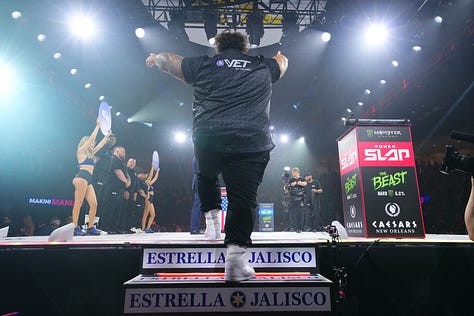
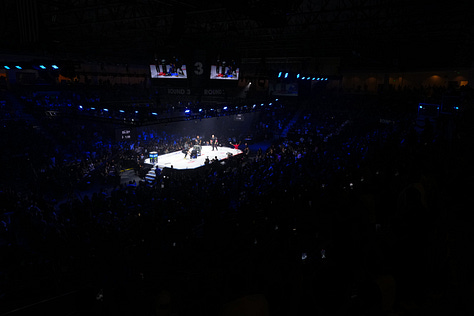
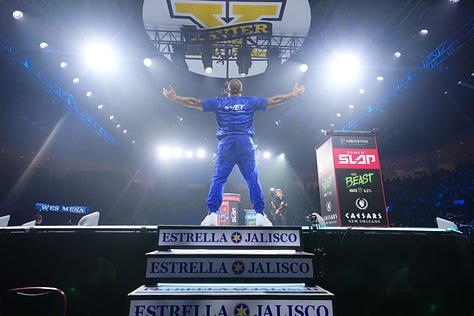
I’m here in New Orleans at Xavier University’s basketball arena, which has been temporarily transformed into a sort of UFC minor league stadium. This is Power Slap’s first event in the United States held outside of Las Vegas. (Unsurprisingly, the organization has also graced Abu Dhabi and Saudi Arabia with its presence.) For the time being, Power Slap tours with the UFC like a deep-pocketed opening act. On Saturday night, roughly 18,000 people will flock to the Smoothie King Center, New Orleans’ NBA arena, to watch the Louisiana-born Dustin Poirier compete in his final fight. The night before, about one in five of those people will head five minutes down the interstate to watch a bunch of guys slap the shit out of each other.
After checking into the media room and extolling the roasted chicken with delegates from Slap News, The Nelk Boys’ subsidiary Full Send, and a Russian rag (who, at the presser, asks when we can expect to see The Dumpling slap again), I spot a cross-section of typical combat sport fans. Middle-aged couples exhibit gendered enthusiasm gaps, pods of dudes in short-sleeved button downs bray in support of the striker they’ve bet on, and divorced dads steer trios of broccoli-haired teens to their seats in what will surely be the high-water mark of this weekend’s visitation. Throughout the concourse, vendor carts hawk cans of Monster Energy’s “The Beast™ Unleashed,” a 6.0% ABV Four Loko retread that, with the limited exception of Monster’s Twisted Tea knock-off “Nasty Beast Hard Tea,” is the only alcohol at the venue being sold to the gen pop. Lines snake tepidly around the watering holes. I catch a mid-fifties man sniff his cup of offputtingly brown malt liquor disconcertedly; his white tee, which depicts a bloodied Donald Trump raising his fist in triumph, warns, “You Come at the King, You Best Not Miss.” Taking my seat, I’m startled by the hum of a drone that nearly grazes my head. It’s the only time all night that I benefit from not sporting the bussin’ haircut.
When the clock strikes eight, the slapping podium rises ominously from the center of the densely-branded mat, whose podium itself is emblazoned with ads for the aforementioned Monster Energy concoction du jour, a cryptocurrency asset called “Vet by VeChain” (trading, at the time of this writing, at $0.0274 a coin), and the moneylines of the respective fighters. The arena is bathed in a narcoticizing blue light—even when your physical body is at Power Slap, it still feels like you’re looking at your phone. After a series of commercials on the in-screen arena, including one indicating that you can earn Vet by Vechain any time you take a photograph of a “sustainable coffee mug” on your phone, Duane “The Iron Giant” Crespo walks to start the night’s only super heavyweight event. His challenger, Makini Manu, is a shot in the arm for the crowd. Manu is magnetic, made for professional wrestling if not a unionized movie shoot. By the time he’s completed the pre-fight Haka, he has the unconditional support of roughly 2,500 bloodthirsty spectators behind him; he’s also got 140 pounds on the Iron Giant. If I were a gambling man, I’d put my theoretical child’s college fund on his -130 odds. Manu, who won the coin toss, slaps first. His opening shot is clunky, disjointed, and off the mark, dragging a relatively unharmed Crespo along the base of his wrist. As Manu rests his sizeable stomach against the podium to get his licking, I read that he’s never been knocked down in any of his four fights.
Look: anyone can throw a slap. Strengthen your hand (more than one fighter tells me fractures are not uncommon), tighten up your core with some rotational work, and find your mark. The hardest part about slapping a guy, as far as I’m concerned, is the attendant guilt and shame. What I want to know is: how the fuck do these guys get hit like this? What mantras flit past their mind’s eye as your opponent winds back? Do they absent themselves of all thought? Do they brace themselves, or stay limp? To borrow from Lil Wayne’s ill-fated interviewer: do they ever get nervous?
Every time I attempt to broach the subject with a striker, it marks a break for the worse in our conversation, a point at which the striker is disabused of the notion that we are two dudes talking and made acutely aware that they are a man talking to a boy. They look at me like I am constitutionally incapable of understanding what they do—in fairness, I suspect I am. Call it evolutionary biology or the pussification of the Western man: I live my life in an ambiently-suspended state of avoiding being hit in the face. These men display no such fear. For Dakota McGregor, being hit just affords an opportunity to get back up; in a life structured by struggle, these slaps are a sort of controlled salvation. Ditto the champ, Damien Dibbell, who lets on in a moment of surprising vulnerability that his ability to take hits stems from his aggressive, turbulent childhood. Manu, for his part, rejects the premise I advance entirely. When I ask him whether he harbors any neurological reservations about taking such hard hits at his side gig, he quips that he’s still waiting for his first real smack. “I can feel the people hitting hard,” Manu confesses, “but I want to know how it feels to be knocked out. I don’t know what it’s like. And it sounds cocky, but nobody has given me that rocking. I’m waiting for that.”
Duane Crespo, it becomes evident, will not be the one who gives Manu his sought-after deliverance. On his first slap, Crespo’s hand seems to pass through Manu’s unmoving head. Ever the showman, Manu keeps his eyes closed as he stands perfectly still before peeking his right eye open in faux-surprise: “did he go?” Before his second shift, Manu cakes Crespo’s face in chalk. His hit, far sounder than the first, leaves Crespo momentarily dazed in a cloud of powder. By Crespo’s second slap, it feels as if even he knows he’s forestalling the inevitable. With his final hit, Manu knocks Crespo’s beard to Arkansas. To his credit, the 285-pound man attempts to roll himself off of the floor and onto his feet, but the officials call it. The crowd, treated to its first knockout of the card, smells blood.
If China initiated a ground war with the United States tomorrow, could America possibly emerge victorious? Should it? Forget that—will God forgive us for how far we have fallen? Is mercy something we deserve? Can I, from where I now stand, even speak of mercy without making a mockery of it?
The main card is a series of executions. The first contest, a middleweight fight between Darren “The Tarantula” Godfrey and Ke’ali’I “The Chief” Kanekoa, initially grabs my attention for its even betting odds. The contestants appear to effortlessly absorb their respective first slaps, but Godfrey insists that Kanekoa flinched. The crowd, upon slo-mo replay confirmation, goes ballistic. At Power Slap, flinching is the gravest possible sin, resulting in both a point deduction and a do-over slap. The arena groans in orgiastic delight as Kanekoa lines up to receive his punishment. Godfrey’s penalty strike sends Kanekoa’s head straight into the podium and his mind to the abyss, and the influencers to my left roar approvingly at justice served.
It's with this knowledge of flinching’s consequences that my heart sinks when, the very next fight, heavyweight Vernon “The Mechanic” Cathey flinches in receipt of a slap from the showman Austin “Turp Daddy Slim” Turpin. Watching Turp Daddy line up his punishment shot activates an ancestral memory within me; I stand in a muddy town square waiting for the sword to fall. It does—or, rather, an already dazed Cathey does. Upon receipt of his second straight strike, the 41-year-old falls head-first into the podium, where he remains in corpselike prayer for about three seconds before the two catchers usher his body down and to the mat. Once horizontal, Cathey lays with his eyes open but obviously lifeless; his right hand fingers stretch out like he is reaching for something just beyond him, a grotesque post-concussion involuntary movement known as the fencing response. The roars around me indicate the crowd’s satisfaction with the prostrate man’s punishment. A triumphant Turpin humps the mat three times before flipping off the arena with both hands.
For all its viewership on social media, Power Slap is yet to establish its own audience. As best I can tell, the only people I can confidently say are here for Power Slap itself and not the UFC match tomorrow are the teeming masses of influencers who appear to have been bussed in like the Soros-funded outside agitators haunting the right wing imagination. After a particularly vicious knockout, I make my way down to the floor’s “influencer section,” where steroidal men with clean fades and surgically-enhanced women walk by with streaming apparatuses not dissimilar to Nathan Fielder’s chest-mounted laptop. When the prelims end, the section transforms into a pigsty within which one mass of bodies leads to the open bar and another lines up for selfies with Theo Von. I tuck a Zyn into my upper lip—when in Rome—and head for the bar.
Idling in line for a drink, I am overpowered with regret about my decision to bring a tote bag to a Power Slap event. Tanned men with cauliflower ears and razor-lines in their eyebrows size me up pityingly; one group remarks disdainfully that I look like a skater. Nearby, a man who looks exactly like Caitlin Clark shares war stories from his time competing both on American Idol and America’s Got Talent. I fortify myself with a gin and tonic, then add a Monster Nasty Beast Hard Tea at the bartender’s encouragement, which was undoubtedly the source of my infernal hangover the next morning. When I ask the bartender to break some cash for a tip, she seems genuinely disarmed. I place $5 into an empty tip bucket and buckle up for the final matches.
As far as his four-year-old twin sons know, Dakota “The Maritime Menace” McGregor is a full-time carpenter on Prince Edward Island. His charming Canadian lilt asserts itself as he shares nightmares of walking in on his two boys taking turns slapping each other in the face. In a sport explicitly intended to go viral, a man is afforded only so much secrecy. The other day, they giddily confronted him: “Dad, you crashed his face!” McGregor somewhat jokingly shares his suspicion that his ex, with whom he coparents, was the leak.
Tonight, McGregor faces off against Robert “The Real Deal” Trujillo for the Power Slap lightweight title. It could be life-changing. A belt, as his boss at the carpentry shop has impressed upon him, means becoming a full-time professional slapper. McGregor is as realistic with himself as he is fearless—he’s too old to fulfill his lifelong dream of competing in the UFC, but he has as fair a shot as anyone at the next best thing. The title fight is a rematch of the inaugural lightweight championship bout three months prior, a dizzying affair during which McGregor was repeatedly battered by the stout, unflinching Trujillo.
McGregor appears to shiver in anticipation of his opponent’s slaps. In their previous match, he was knocked to the ground in the second round and staggered drunkenly in the third. By the final hit, he seemed to have forgotten where he was, responding to the strike by lifting his left fist in a fighting pose. The Canadian lost by unanimous decision, but still raised five fingers in pride, one for each beating he endured. In anticipation for the rematch, he has trained by receiving repeated slaps in the face from a pool noodle. He tells me that he’s working on bracing himself before being hit; in the past, he opted to receive slaps limply.
The first of the night’s two title fights, the McGregor-Trujillo contest is five rounds rather than the standard three. The PA man informs the audience that this fight is presented by Happy Cat—tagline: no more skinny cats—which strikes me as the only sponsor not directly invested in the corrosion of our societal fabric. McGregor emerges from the tunnel to mostly boos; the crowd, for whatever reason, has aligned themselves with the defending champion. The Canadian is noticeably taller and longer than Trujillo, physical measurements that would matter tremendously if these men were fighting rather than exchanging undefended wallops. What McGregor does have going for him is that he won the coin toss, meaning he gets to hit the belt-wearer first.
McGregor bends, takes his measure, and swipes his hand through Trujillo’s unbothered face. In return, he receives a boxy, uneven hit. By the time McGregor’s second slap appears to yet again pass through Trujillo’s hologram of a head, a sense of dread begins to settle on the carpenter’s red face. He braces, his body shakes, Trujillo claps him cleanly, and the carpenter hits the floor. McGregor, exhibiting his characteristic toughness, attempts to rush to his feet before his corner intervenes. There’s a strategic advantage, I learn, to staying down for as many of the ten seconds as you’re afforded before the fight ends in a knockout. McGregor takes a knee as the crowd bellows, waits his nine seconds, and stands back up. For the first time all night, the crowd has been taken by his ineffable charm. We also know, beyond the shadow of a doubt, that McGregor has exactly one more shot at his opponent before his battered face gives in.
As McGregor lines up his third slap of the night, I grapple with a cognitive dissonance I’d never anticipated encountering in my life. I am rooting, in the ostensible name of mercy, to see a man with his hands held behind his back get knocked out. The beet-red McGregor lines up his shot with a wobbling hand; his first wind-up misses the mark entirely. He delivers his weakest hit of the night, and I can hardly bear to watch his final defense. McGregor fortifies his body as if to forestall the obvious. When he’s hit, he falls immediately into the arms of the two catchers behind him. For a second straight fight, I watch a man hold his claw-like fingers over an unconscious face. I hope that his sons did not get to watch.
Power Slap’s ascent coincides with a broader push across American organized sports to minimize brain injuries. The organization’s representatives arm themselves with stock responses—when asked about safety concerns, CEO Frank Lamicella listed the organization's medical protocols before laughingly admitting his relief that he has fallen out of practice of reciting them. So, too, did every striker I spoke with wave away concerns of brain trauma and the attendant specter of CTE. As far as everyone’s concerned, these guys are vetted stringently, attended to diligently, and exposed to far less brain trauma than any other combat athlete or football player. It’s not that any of these things are untrue, but where brain trauma is a baked-in component of football, boxing, and mixed martial arts, the spectacle of brain trauma is the main attraction of Power Slap. Power Slap athletes almost certainly endure fewer combined blows to the head than an offensive lineman or regularly-sparring boxer, but they are also the only athletes for whom half of the job description is “defenselessly take a hit to the face and try to stay awake.” Lamicella insists that the organization has “run toward regulation,” but the fact that Power Slap is only sanctioned in California, Nevada, Florida, Texas, Oklahoma, and Louisiana suggests that the effort has been closer to a jog. Whether or not Power Slap is safer than other concussive sports feels secondary to what it represents about the role knockouts play in the contemporary cultural libido. Spiritually, Power Slap is the perfect sport for Donald Trump’s second term, a bloody period of rapid decline brought about by a vox populi yearning to say slurs again.
Damien “The Bell” Dibbell, the longest-reigning Power Slap Heavyweight Champion, is saving up for law school. The plan, he tells me, is to defend his belt a few more times, move up to New York to make himself eligible for in-state tuition rates, and eventually become a public defender. His face, which I’ve seen emblazoned upon promotional billboards around New Orleans all week, betrays a tacit awareness of the absurdity of his career path. He is grounded, humble, measured, and ambitious; it just so happens he’s put himself in a position to pursue a legal career and buy his dream car because of a preternatural ability to take and deliver slaps to the face.
Setting aside, for a moment, questions about the morality or desirability of Power Slap’s existence, Damien Dibbell’s story serves as one of the most compelling arguments for its viability as a major sports organization. Dibbell, who used Power Slap to supplement his income as an HVAC professional before his talent put him in a position to make legitimate money on the circuit, is as dominant a slapper as the young sport has ever seen. The 23-year-old is inevitable and immovable; in 2024, he won Power Slap’s “Chin of the Year” award for his unbreakable composure. His understated slaps make 250 pound men crumble like a house of cards. Hearing his future plans, I imagine a world in which Michael Jordan left the NBA not for professional baseball but for the Iowa Writers’ Workshop. At the risk of armchair psychoanalysis, I am struck by the concept of Dibbell funding a future career defending vulnerable people through being the best at slapping defenseless people.
Ahead of the main event, Dibbell emerges from the tunnel with the swagger of a man at the height of his powers and the showmanship of a DMV clerk. He sizes up his competitor, Wes “Boom” Mena, the way I imagine he'll someday size up the bar exam: an inconvenience that he must get through to end up where he wants to be. Once Mena sets his feet, Dibbell takes his aim and winds his extended arm back like a whip. His first shot is both deafening and easily absorbed, but replays suggest Mena got away with an uncalled flinch. Mena winds up his first strike on the wrong end of two compounding misfortunes, having become an enemy of the crowd and being tasked with knocking Damien Dibbell down. His circular wind-up produces a thunderous smack. While Dibbell does not move, his eyes suggest that Mena has earned his respect. During his one-minute recovery, Dibbell wipes chalk from his powdered face as the in-arena monitor loops footage of his face being flattened. Dibbell’s next slap is a thunderclap, knocking Mena’s protective earplug into the sky and Mena’s body onto the mat. Mena attempts to get to his feet, but for the first time all night, sense prevails. Damien Dibbell, having successfully defended his heavyweight belt, lets out an uncharacteristic shout. For Dibbell, the moment marks one step closer to the freedom to pursue the rest of his life. For the rest of us, it’s time to head to the casino.
From a product standpoint, Power Slap is a gambler’s catnip. Each slap presents a discrete opportunity to toss a live bet; each striker’s odds are prominently displayed throughout the broadcast and in-arena production. Power Slap, then, represents a synthesis of the interlocking and self-reinforcing logics of modern, mediatized society: stylized violence and sensationalist standard-flouting begets vertical video, which begets algorithmic manipulation, which begets the gambling and advertising dollars that keep the machine rolling. It’s only fitting that the logic of this boorishly masculine ouroboros requires that Power Slap give the influencers who keep the show going a venue to gamble at after.
The line to enter Caesar’s Casino feels similar to a bar at the Jersey Shore, instilling within me a sense of placelessness interrupted only by the disproportionate sight of men who bear semicircular welts on their left cheeks. When the friend I’ve enlisted as a photographer and I get in, we’re ushered around by Power Slap’s personable press liaison. She keeps a close eye on us, citing “security reasons.” She escorts us to the high limit room, whose cloistered space has been converted for the evening into the official Power Slap afterparty.
Due to the glaring and regrettable absence of craps tables, the afterparty feels less like a high-roller gambling bonanza than the hour of a prom afterparty where all the dudes’ dates have gone home. I speak to a beautiful young man with manicured eyebrows and an attendant entourage of lackeys who identifies as an influencer—his beat, he reveals, is “talking to females.” I meet a group of young bankers from Mobile, Alabama who quit their stint as high-rollers after learning the hard way why their Caesar’s Player’s Cards got them free rooms in Las Vegas. Elsewhere, a group of brace-faced young men from outside of New Orleans have gotten the drop on the strip club some of the UFC fighters will end up at tomorrow. They tell my friend and I about a casino cruise that disembarks from Kenner, Louisiana and will take you wherever you want to go gratis if you log enough time at the low-limit blackjack table, before giddily inviting us to watch their boy lose hand over fist at the $100 limit table behind them. I catch sight of a sweaty, victorious Makini Manu standing with his mother behind a man wearing a Stake baseball hat. When I go to congratulate him, I see that he is holding seven skewers of meatballs in his right hand.
As the night progresses, my photographer and I adopt a twenty-something man previously standing alone behind a blackjack table. With limited prodding, the life insurance salesman from Corpus Christi explains that he came alone for tomorrow’s fights, enjoyed his solo time at Power Slap, and is mostly at the afterparty to catch a glimpse of Dana White in action. He’s instructive of a class divide within the mass of jersey-wearing dudes elbowing for room at the open bar: there are the guys Dana flew out here, and then there are the guys who drove out here to see Dana. Our companion attributes his ability to afford tickets while his sad sack friends watch at home to the lessons he learned from Andrew Tate’s Hustlers University. For $50 a month (Tate recently raised the price to $200 a month, which the young man tells us is still a bargain), he gets access to courses and individual counseling on all things hustling, from crypto trading to drop-shipping to, as he insists, how to get ahead in the business of selling life insurance. His eagerness to hang out with the guy dressed like a skater and my friend in a pickleball-induced crutch makes him the most ostensibly pluralist dude in the room.
Just as my attempts at bro’ing out begin to stall, the press liaison whisks us into the tightly-guarded back room. Past two off-duty Orleans Parish Deputies and a number of muscular bodyguards, we find a room full of people filming a baccarat table with their cell phones. Above the table looms a professional boom mic. I make my way around to see what the hubbub’s about, only to find Dana White, his son Aidan, SteveWillDoIt (a Nelk Boy famous for chugging entire handles of liquor), and RazzaqLocks (a gambling influencer), all giddily massaging their cards. It’s here, standing around a table packed with hangers-on delightedly watching Dana White gamble, that I can finally make sense of Power Slap as a business proposition. It’s not that Dana White–both the North Star and patron saint of the manosphere–is confident that his Power Slap gamble will hit, but that he understands the ascendant forces in American culture will pay just to watch him gamble. The sense that he’s correct hits me like a slap in the face.




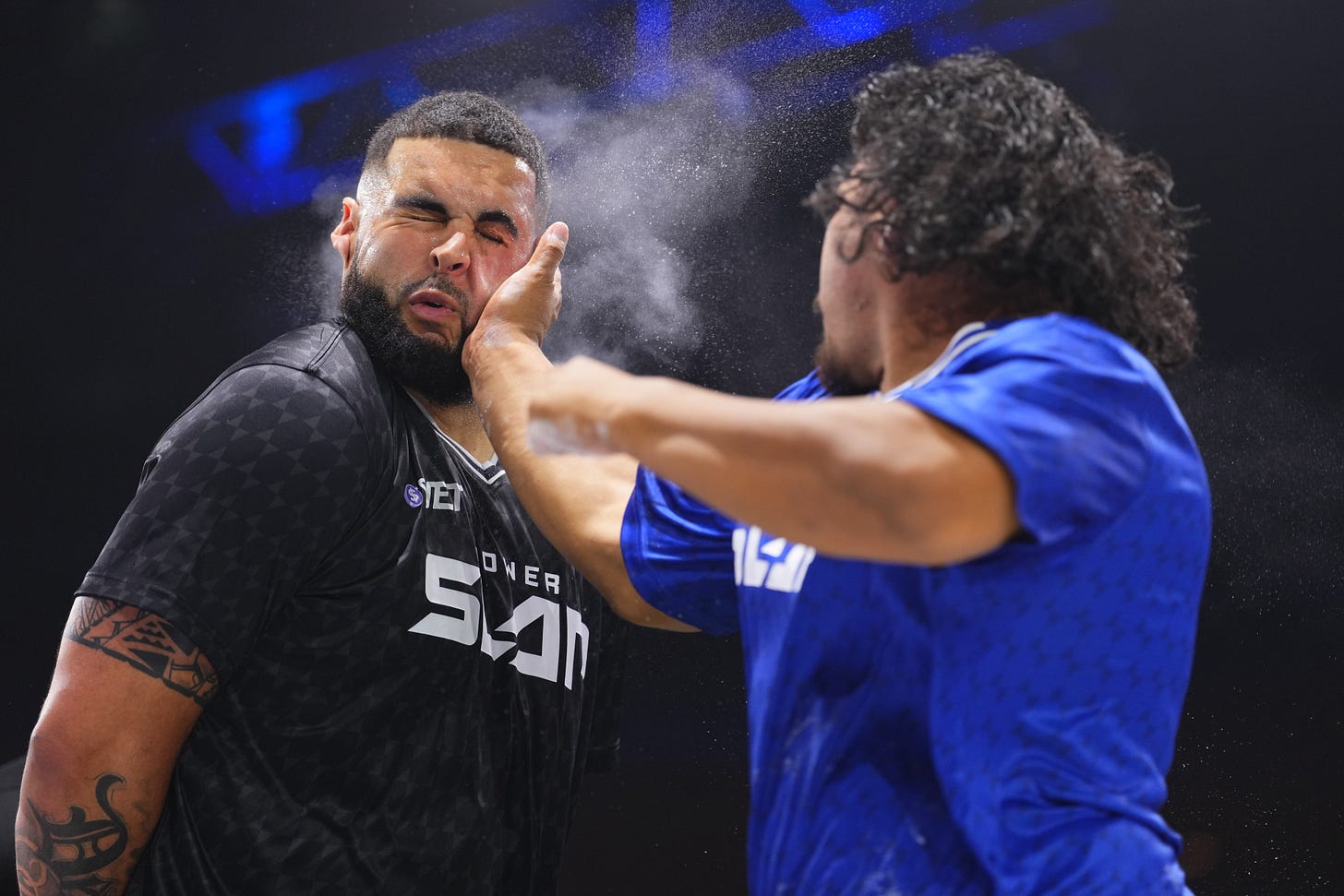
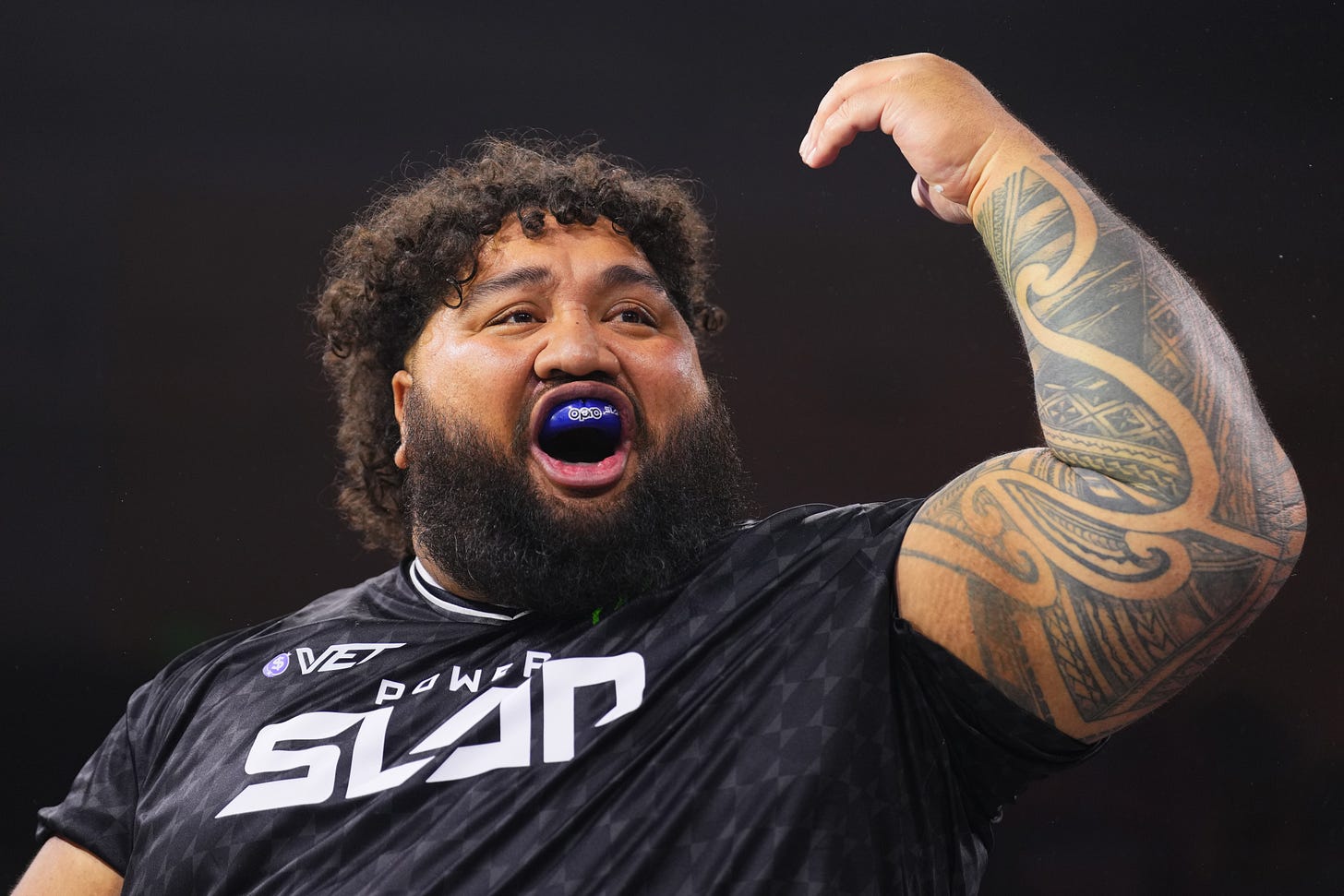

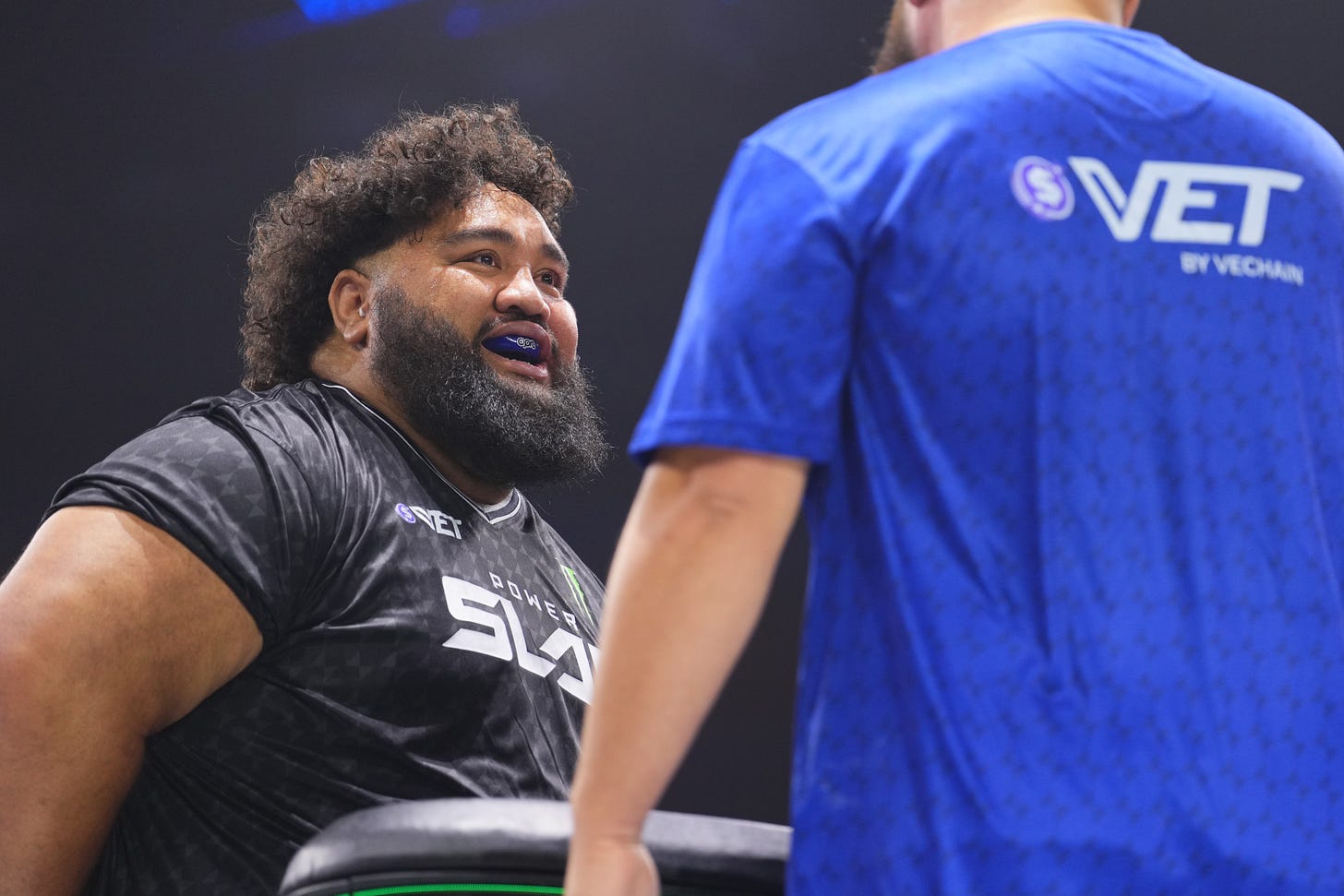



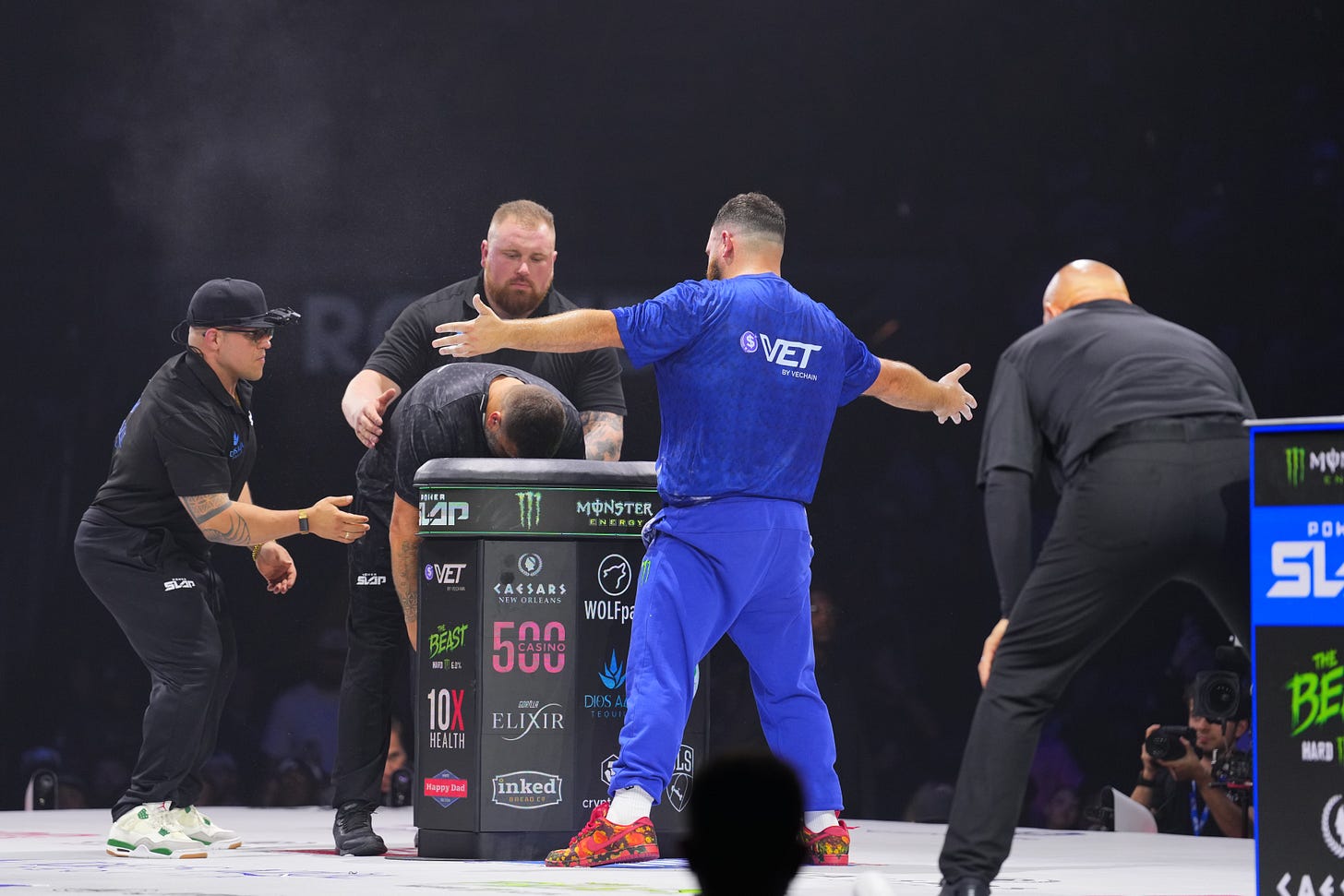
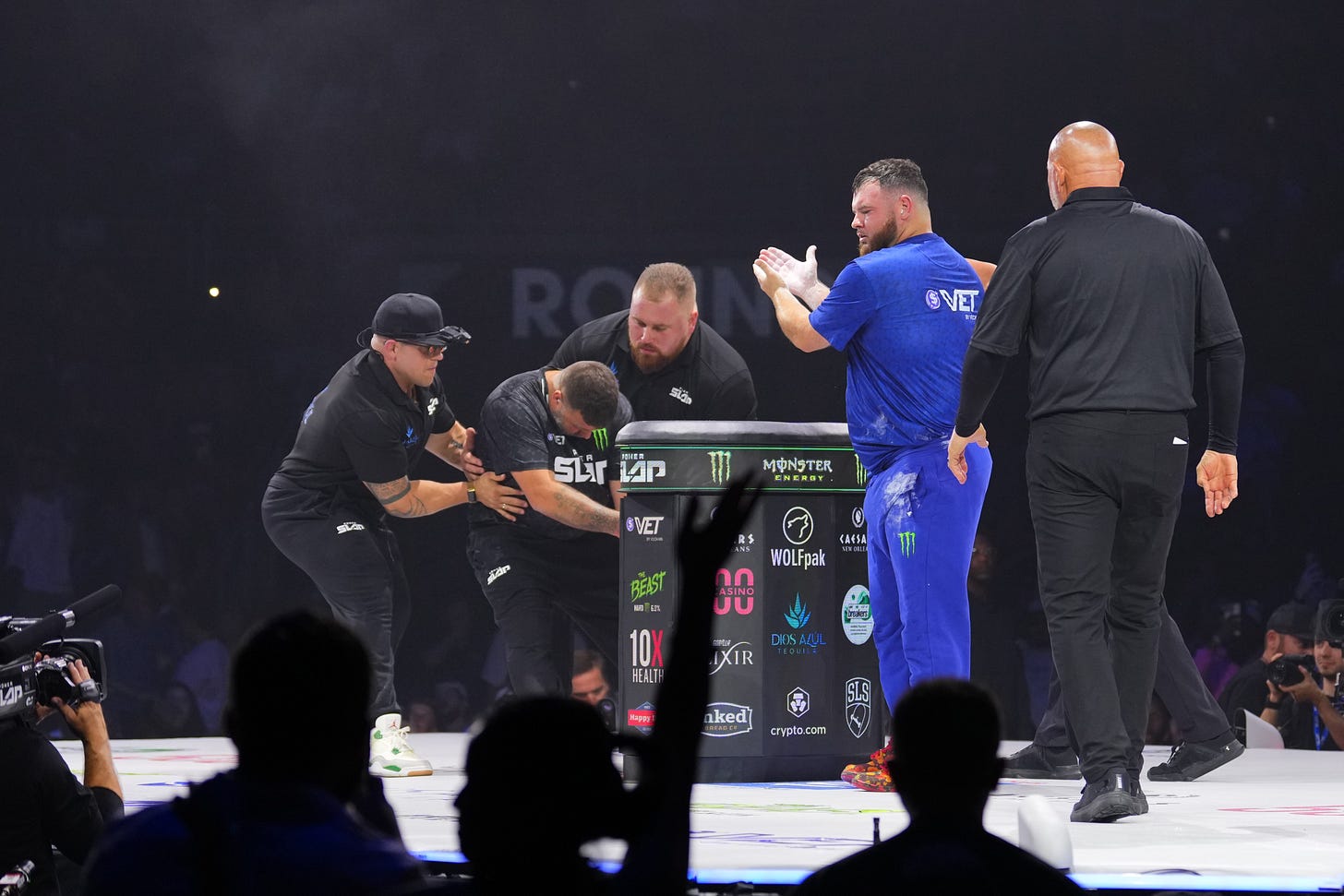





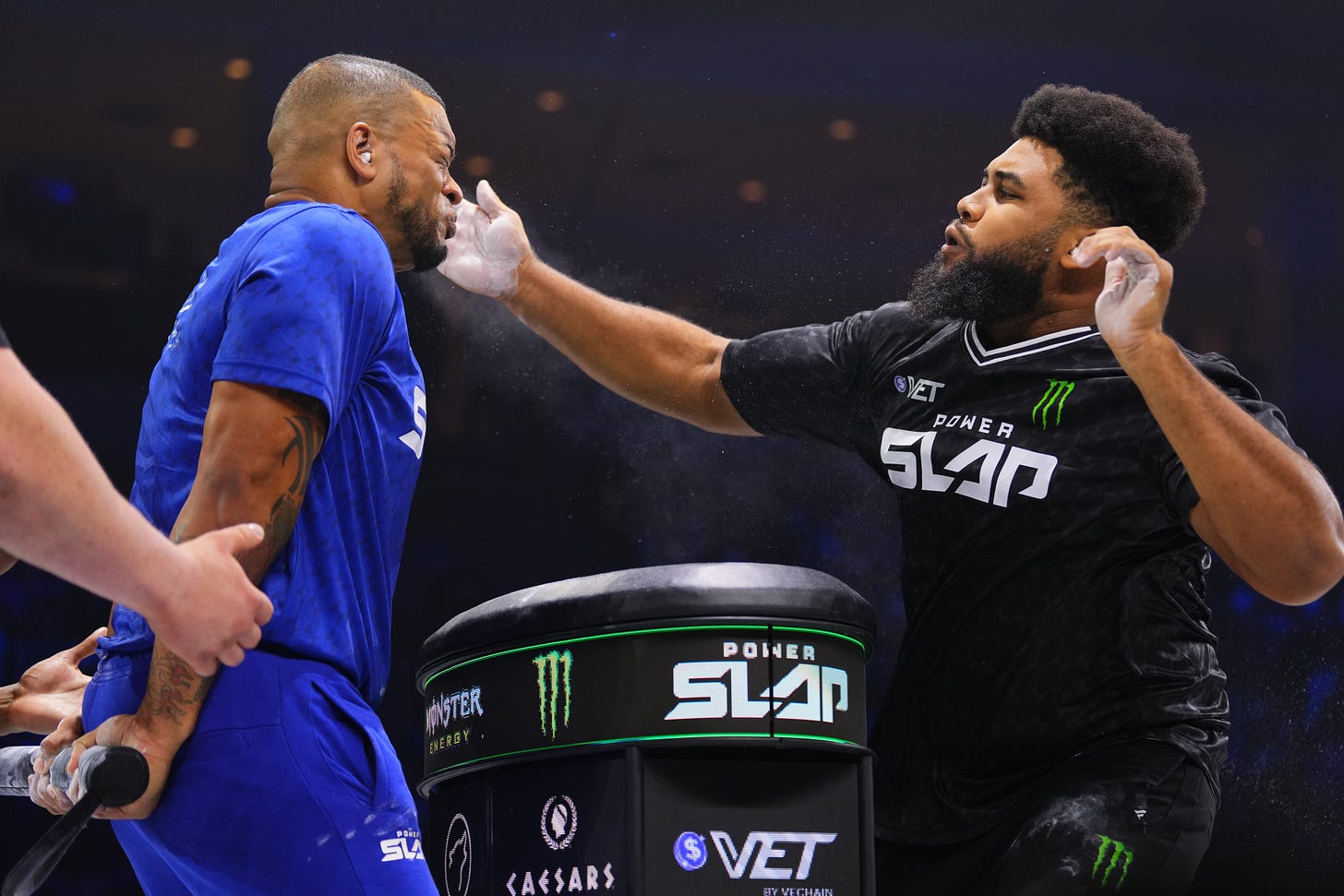


"I am overpowered with regret about my decision to bring a tote bag to a Power Slap event."
this mf spittin
also good luck to mr Dibbell, may he one day give this crooked US justice system a hard corrective smack